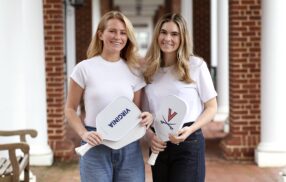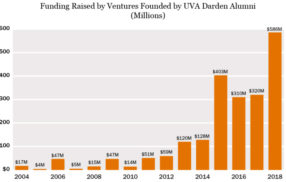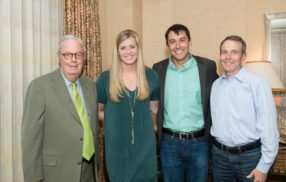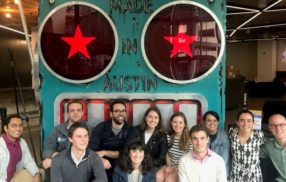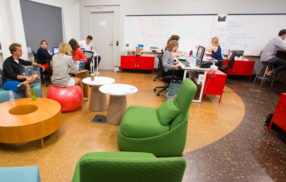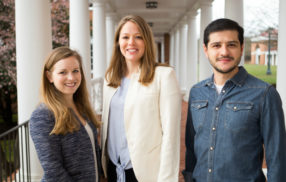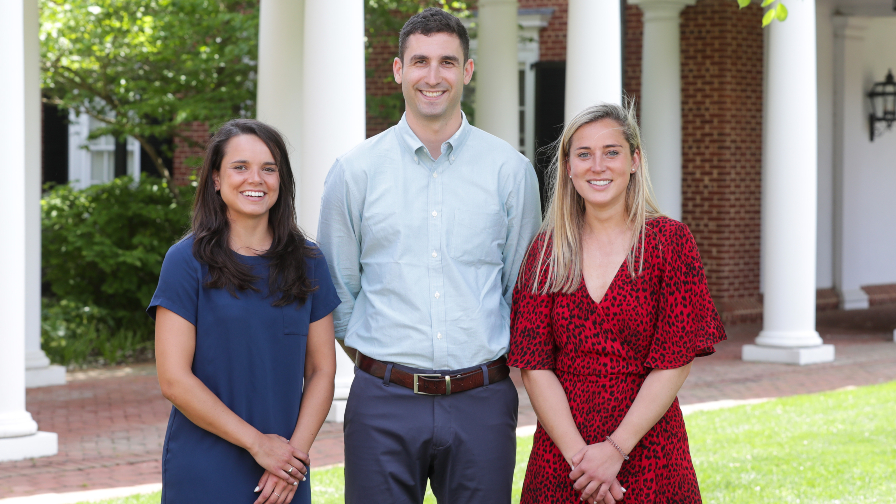
Batten Technology Venture Fellows: What You Learn When You Intern With a Startup
By Dave Hendrick
For the third year in a row, a select group of University of Virginia Darden School of Business students had the opportunity to gain hands-on experience working with well-funded startups working in a range of industries across the country.
Through Darden’s unique Batten Technology Venture Fellows program, which is administered by the Batten Institute for Entrepreneurship and Innovation, three internship-seeking Darden students interviewed with venture capital firms for the opportunity to work with one of the companies in the venture capital firm’s portfolio.
The third cohort worked with startups in New York City, the San Francisco Bay Area and Austin, Texas, with ventures backed by BlueRun Ventures, Glynn Capital, and for the first time, Greenspring Associates.
“This was Greenspring Associates’ first year participating in the program and we had a very favorable experience throughout,” said Greenspring Associates Principal Adair Newhall (MBA ’09) “It was apparent from the start that the students participating were of the highest quality and integrity. My firm has greatly enjoyed the opportunity to engage with the students and to support the Darden network.”
This year’s cohort — Class of 2020 students Cara Jankowski, Zach Lynch and Meg Lyons — recently reflected on their high-impact summers.
Highlights of the conversations are included below.
Zach Lynch
Former Morgan Stanley equity researcher Zach Lynch spent his summer working with the fintech company Kabbage. Kabbage is backed by BlueRun Ventures, whose general partner is Jonathan Ebinger (MBA ’93).
Why did you choose to pursue the TVF path for your MBA internship?
There are a few reasons TVF made sense for me. First, it fell in line with my aspirations for the summer, providing an opportunity to work at a scaling tech company. Second, it gave me a chance to develop a relationship with Jonathan Ebinger at BlueRun. He gave me insights and context for my work at Kabbage, which further contributed to my development.
Can you describe your summer experience?
Over the summer, I was tasked with analyzing Kabbage’s touchpoints with customers — such as phone calls, emails and chats — and developing a prototype that would solve a pressing need within the company. After interviewing multiple stakeholders and exploring the database, I documented my findings and created a prototype for a dashboard that supported the sales and customer support teams.
Did your time at Darden prepare you for the summer?
The Darden core proved to be a great training ground for my time with Kabbage. First, it gave me context for everything I experienced and allowed me to piece together the different parts of the business with a more holistic understanding. Second, the case method really forced me to attack my project with an approach that required diligence and an open mind. Third, my first year of data science classes gave me the tools for succeeding with the technical demands of the internship. There were many times over the summer where I did not know how to solve a specific problem, but I had the fundamental understanding to be able to learn quickly.
Was there a defining moment or lessons from your TVF experience that you think will stay with you?
A defining moment for me was my team winning the internal, Kabbage Hack Day competition. The code and idea for my summer project was used as a basis for the prototype we developed. After we were selected as the winning team, my manager presented our prototype to the entire company in a town hall meeting. Based on feedback, I am optimistic the prototype will be developed into an app that will be leveraged by the company in the future.
What would you tell other Darden students who are considering a TVF?
The TVF is a great option for anyone interested in a VC-funded tech company. Smaller companies tend to give offers in the spring; the TVF can provide a chance to hear earlier instead of being pressured to choose the bird-in-hand from a larger firm.
What’s next for you professionally? How did TVF impact your post-Darden career ambitions?
After Darden, I want to work at a tech startup in a strategic role. Having studied both business and data science, I am excited by the prospect of contributing to a scaling company, especially one that captures and utilizes unique data.
The TVF confirmed my ambition to work at a scaling tech company. At a company the size of Kabbage, there is ample opportunity to take ownership and affect change. As I realized this summer from such a fast-growing company, there is a surplus of ideas and shortage of people to carry them out.
Additionally, my summer showed me what it is like to have a data-centric role within a strategic team. My interests lie in implementing a strategy to leverage data in order to solve problems. My next position after Darden will hopefully include some of those strategic elements.
Meg Lyons
Former Google Product and Brand Marketing Manager Meg Lyons worked with the freelancer management software company Kalo over the summer. The San Francisco-based company is backed by the Glynn Capital Management. Founder and CEO John Glynn teaches at the Darden School and is a member of the Darden School Foundation Board of Trustees.
Why did you choose to pursue the TVF path for your MBA internship?
The Technology Venture Fellowship was exactly the kind of experience I hoped to find at Darden. I saw this unique opportunity as a critical piece of my Darden roadmap. I wanted to focus my energy on the early to mid-size startups, and the venture capitalists who strategically invest in them.
My goal for this past summer was to dive into an entrepreneurial venture, be a sponge, and make an impact — while gaining exposure and experience in the VC space. I saw this fellowship as an opportunity to test my Google “degree” at a smaller firm while exercising my growth mindset in the energy-driven excitement of a startup environment.
Can you describe your summer experience
During my internship experience, I had the opportunity to wear many hats, and work, yet again, on both coasts. I ended up starting work during the school year to gain a deeper understanding of Kalo’s business model and what they were trying to accomplish so that Day 1, I would be able to dive right in.
As a result, I was fortunate to work directly with Kalo’s CEO and COO to set the strategic direction for the company, develop key consumer insights through extensive consumer research, and so much more. Additionally, I was fortunate to spend time with the Glynn Capital team in Menlo Park, learning more about the VC space, including the respective roles of key individuals, and provide my own investment analysis on prospective opportunities.
Did your time at Darden prepare you for the summer?
Absolutely. The combination of the skills I developed and honed at Google, along with collaborative skills and lessons learned in in “Finance,” “Operations,” “Paths to Power,” “Effectual Entrepreneurship,” and many other first-year core curriculum classes empowered me to make a significant contribution to the portfolio company.
Was there a defining moment or lessons from your TVF experience that you think will stay with you?
While I was interning this summer, mid-way through the summer, Kalo’s HQ changed from San Francisco to New York City. As someone not only familiar with the tech world, but also both markets, I was able to, as my college coach was fond of saying, “stop on a dime” and adjust. Given the current stage of the portfolio company, change was the constant when it came to the number of employees, objectives and goals. Therefore, my ability to pivot, based on the current daily focus, was an important asset to the Kalo work environment.
I also realized through the course of the summer that my storytelling skills mirrored that of a consultant, and became notably beneficial when I was presenting ideas to the wider executive team, sharing key results, and looking to gain buy-in.
What would you tell other Darden students who are considering a TVF?
Overall, there are two ways to look at your MBA summer internship experience. First, going all-in on a role, company or location where one would hope to secure a return offer. Many succeed in this regard, and can stroll into second year at Darden with the confidence that they are ready and excited for the next step. Then, there is another group looking to “experiment” or try something out for 10 to 12 weeks. I was firmly in the second camp, and viewed the summer as an opportunity to position myself closer to a true north. For folks in that camp with an entrepreneurial spirit, I cannot think of a better opportunity than TVF.
What’s next for you professionally? How did TVF impact your post-Darden career ambitions?
TVF has me very excited about the opportunity to explore the venture capital space further as a future career. Prior to this summer, I had not had exposure to the field, but always found it extremely interesting. This space aligns with my career ambitions, genuine interests, and my passion for investigating the latest and “next to be” trends. This year, I was selected as a UVA Seed Fund Fellow, which I view as another important opportunity to gain even more experience in the VC space.
Additionally, I enjoyed being in an operating role: wearing many hats; and making a real, concrete impact on a growing Series A business. I was able to run with my own projects; I was trusted to make key decisions and represent the company and brand well. I loved the small, collaborative environment working with top-notch former entrepreneurs and executives, and I could definitely see myself thriving in another opportunity such as this. I firmly believe that operating experiences make one an even better venture capitalist, and I foresee both of the above roles in my post-Darden future.
Cara Jankowski
Former HubSpot Product Manager Cara Jankowski spent her summer working in Austin, Texas, with the digital health insurance startup Bright Health. The company is backed by Greenspring Associates, where Adair Newhall is principal.
Why did you choose to pursue the TVF path for your MBA internship?
At HubSpot I was lucky to be on the team from around 700 employees to over 2000. I wanted to experience an earlier stage company and to build my network on the investing side. I also wanted to use my skills in all areas and wear many hats — not to be siloed to a particular role. TVF was the perfect option as an MBA student interested in this type of opportunity. It provided the mentorship from a Darden alum, a direct connection to high-growth, venture-backed companies and the ability to jump in and take on different roles. Lastly, the timeline allowed me to solidify an opportunity with an early stage company on a much earlier recruiting schedule than would normally be possible for startups.
Can you describe your summer experience?
This summer I worked for Bright Health, a digital health insurance start-up, through Greenspring Associates and Adair Newhall. They’re headquartered in Minneapolis but have their technology teams in Austin where I worked. Over the summer I took on a wide range of projects. I worked on a marketing acquisition campaign for paid media, created a website testing strategy and consulted on improvements to website user experience using various data analytics platforms. Overall, I had a great experience working across design, marketing, engineering, operations and product.
Did your time at Darden prepare you for the summer?
The ability to distill a large amount of new unfamiliar information was a big one. In my case being able to process a lot of information — I had no background in health care — and jump right in and ask the right questions was huge for me to make an impact in my work in 10 weeks. I also felt my ability to frame stories and communicate recommendations was another take away from first year. Through the countless cases I have become much stronger at pulling together my opinion with evidence including supporting data and research. Lastly, I had the confidence to jump in and take on any role and work better cross-functionally. Going into the summer I had the experience and skills to talk to finance, ops and product/engineering without skipping a beat.
Was there a defining moment or lessons from your TVF experience that you think will stay with you?
My first day as an intern the person who was supposed to manage me decided to leave the company. This was an initial shock but it made my ability to deliver and work with the team with autonomy and execute on a project with little to no guidance all more valuable. The big lessons for me were to not hesitate to be proactive and move things forward as well as the value in adapting to change with the people and resources you have.
What would you tell other Darden students who are considering a TVF?
I would really encourage anyone who wants to work at an early stage company, starting their own thing or is thinking about VC in the long term to consider TVF. It gives you the unique opportunity to be thrown in the startup world as an MBA and gives you a strong relationship with an established VC in the Darden network.
What’s next for you professionally? How did TVF impact your post-Darden career ambitions?
The TVF process and working for Bright Health definitely helped affirm that I want to be at an early stage company or small scrappy team within a larger one, ideally with a technology focus. Long term I hope to either start my own company or join a VC firm.
Any other lasting lessons or thoughts on the program?
TVF showed me first hand how much the Darden network is willing to help. This program wouldn’t exist without the willingness of VCs who are Darden alums to take time to sponsor on their own time. Adair was beyond helpful and supportive throughout the process and during the internship. I will definitely look to him as a mentor as I proceed in my career.
Watch this year’s Technology Venture Fellows cohort discuss their experiences working for high-impact startups.
The Batten Technology Venture Fellows Program will begin its fourth year in October, when applications will be accepted for review by the sponsoring venture capital firms. Confirmed sponsors for the 2019–20 Batten Technology Venture Fellows Program are: BlueRun Ventures (founding sponsor), Glynn Capital Management (founding sponsor), Greenspring Associates and new sponsor New Markets Venture Partners.
For more information about Batten Technology Venture Fellows, contact batten@darden.virginia.edu
The University of Virginia Darden School of Business prepares responsible global leaders through unparalleled transformational learning experiences. Darden’s graduate degree programs (MBA, MSBA and Ph.D.) and Executive Education & Lifelong Learning programs offered by the Darden School Foundation set the stage for a lifetime of career advancement and impact. Darden’s top-ranked faculty, renowned for teaching excellence, inspires and shapes modern business leadership worldwide through research, thought leadership and business publishing. Darden has Grounds in Charlottesville, Virginia, and the Washington, D.C., area and a global community that includes 18,000 alumni in 90 countries. Darden was established in 1955 at the University of Virginia, a top public university founded by Thomas Jefferson in 1819 in Charlottesville, Virginia.
Press Contact
Molly Mitchell
Associate Director of Content Marketing and Social Media
Darden School of Business
University of Virginia
MitchellM@darden.virginia.edu





